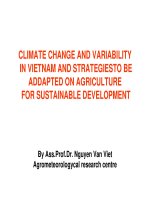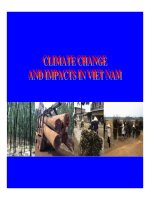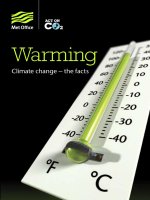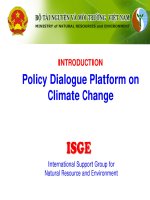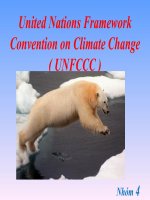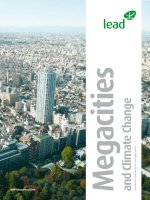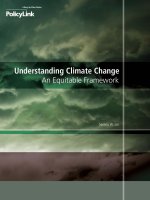Syllabus: Climate change
Bạn đang xem bản rút gọn của tài liệu. Xem và tải ngay bản đầy đủ của tài liệu tại đây (184.9 KB, 5 trang )
THAI NGUYEN UNIVERSITY OF AGRICULTURE AND FORESTRY
INTERNATIONAL PROGRAM OFFICE
ATM116
CLIMATE CHANGE
Syllabus
1
Teaching Staff
Subject lecturer: Ho Ngoc Son
Organization: Thai Nguyen University of Agriculture and Forestry
Office Location: Thai Nguyen University of Agriculture and Forestry
Phone: 02803851427
Mobile phone: 0976 501 716
Email:
Subject Overview
How aggressively and in what way should society take action to reduce damages from
climate change? In this course we will examine the balance between expected impacts and
their costs one hand and policy options and their costs on the other. We will consider
mitigation options to reduce future climate change, as well as adaptation alternatives to
prepare for the changes that do occur.
Using both economic and ethical perspectives, we
will examine the models, data and assumptions behind competing leading arguments for
how society should respond.
We will evaluate policies implemented to date at the
international, national and state levels. The gap between ideal and actual responses will be
discussed using insights from game theory, theories on the use of science in policy and
analysis of public attitudes.
Learning Outcomes
[Description of the learning objectives on knowledge, skills and attitude the students are
expected to have upon completion of the subject (around 100-200 words)]
Subject Structure
Students are expected to attend [how many] lectures.
The Subject’s timetable is as follows:
Lecture time and location:
[lecture time]
[location]
List of lectures
Time/date
Topic
Note
2
Week 1
Week 2
Week 3
Week 4
Introduction to subject
Groups to be
Lesson 1: Weather and climate change
decided
Lesson 2: Causes of climate change
Assignment 1 of
Tutorials/group work
group 1 due
Lesson 3: Sources of greenhouse gases
Assignment 1 of
Tutorials/group work
group 2 due
Lesson 4: Impacts of climate change on natural
Assignment 1 of
systems (forests, biodiversity, water)
group 3 due
Tutorials/group work
Week 5
Lesson 5: Impacts of climate change on social
Assignment 1 of
systems (human health, community, the poor)
group 4 due
Tutorials/group work
Week 6
Week 7
Lesson 6: Adaptation to climate change
Assignment 1 of
Tutorials/group work
group 5
Lesson 7: Climate change and its impacts in
Assignment 1 of
Vietnam
group 6 due
Tutorials/group work
Week 8
Week 9
Week 10
Lesson 8: Climate change and development
Assignment 1 of
Tutorials/group work
group 7
Lesson 9: Climate smart agriculture
Assignment 1 of
Tutorials/group work
group 8
Lesson 10: climate change and REDD+
Assignment 1 of
Tutorials/group work
group 9
Reading materials:
1. Neil leary, 2008. Climate change and adaptation, Earthscan, London.
2. Anthony Giddens, 2009. The politics of climate change, Cambridge.
3. UNDP, 2008 . Human development report 2007/2008: Fighting climate change: Human
solidarity in a divided world, New York.
4. WB. 2010. Climate change and economic policy in APEC economies, Synthesis report.
New York.
Lecture Attendance Requirement:
Attendance at all lectures is expected. If, for whatever reason, you cannot attend the lecture,
please let the lecturer know in advance. You are required to attend a minimum of 75% of
lectures.
3
Assessment
Assessment for this subject consists of :
Assessment type
Percentage
Assignment 1/Participation
20%
Midterm exam
30%
Final exam
50%
Due Date
Assessment Criteria: [criteria for each kind of assessment must be clarified]
Grading system
Grade
in letter
A
1-4
scale
4
1-10
scale
8.5 – 10
B
3
7 – 8.49
C
2
5.5 –
6.99
D
1
4 – 5.49
Description
Excellent
analysis,
comprehensive
research,
sophisticated
theoretical
or
methodological
understanding, impeccable presentation;
Work that meets all the key assessment criteria and
excels in most;
Work that meets these criteria and is also in some way
original, exciting or challenging could be awarded
marks in the high 8 or above.
Marks of 9 and above may be awarded to the best
student work in the range.
Good work that is solidly researched, shows a good
understanding of key ideas, demonstrates some use of
critical analysis along with good presentation and
documentation;
Work that meets most of the key assessment criteria
and performs well in some;
Work that shows some room for improvement.
Completion of key tasks at a satisfactory level, with
demonstrated understanding of key ideas and some
analytical skills, and satisfactory presentation,
research and documentation;
Work that meets most of the key assessment criteria;
Work that shows room for improvement in several
areas.
Completion of key tasks at an adequate level of
performance in argumentation, documentation and
expression;
Work that meets a limited number of the key
assessment criteria;
Work that shows substantial room for improvement in
many areas.
4
F
0
1-3.99
Work that fails to meet the basic assessment criteria;
Work that contravenes the policies and regulations set
out for the assessment exercise;
Where a student fails a subject, all failed components
of assessment are double marked.
Extension Policy and Late Submission of Work
Late work is not accepted. If, however, you find that it is absolutely impossible for you to
make a given deadline due to illness or other unforeseen circumstances, you may negotiate a
short-term extension of up to 5 working days. But please note: Extensions are not granted
after due dates have passed.
Penalty for Submission of Late Assessment
Assessment submitted late without an approved extension will be penalised at 2% per
working day. In-class tasks missed without approval will not be marked and in-semester
tests and exams that are submitted late without an approved extension will not be accepted.
Plagiarism
Plagiarism is academic misconduct, and is taken very seriously by the Program and
University. Any acts of suspected plagiarism detected by assessors will be followed up, and
any students involved will be required to respond via the Program and/or University
procedures for handling suspected plagiarism. If you have questions about how to
appropriately acknowledge your sources, please let the lecturer know.
International Program Office
Signature
Lecturer
Signature
Duong Van Thao
5
